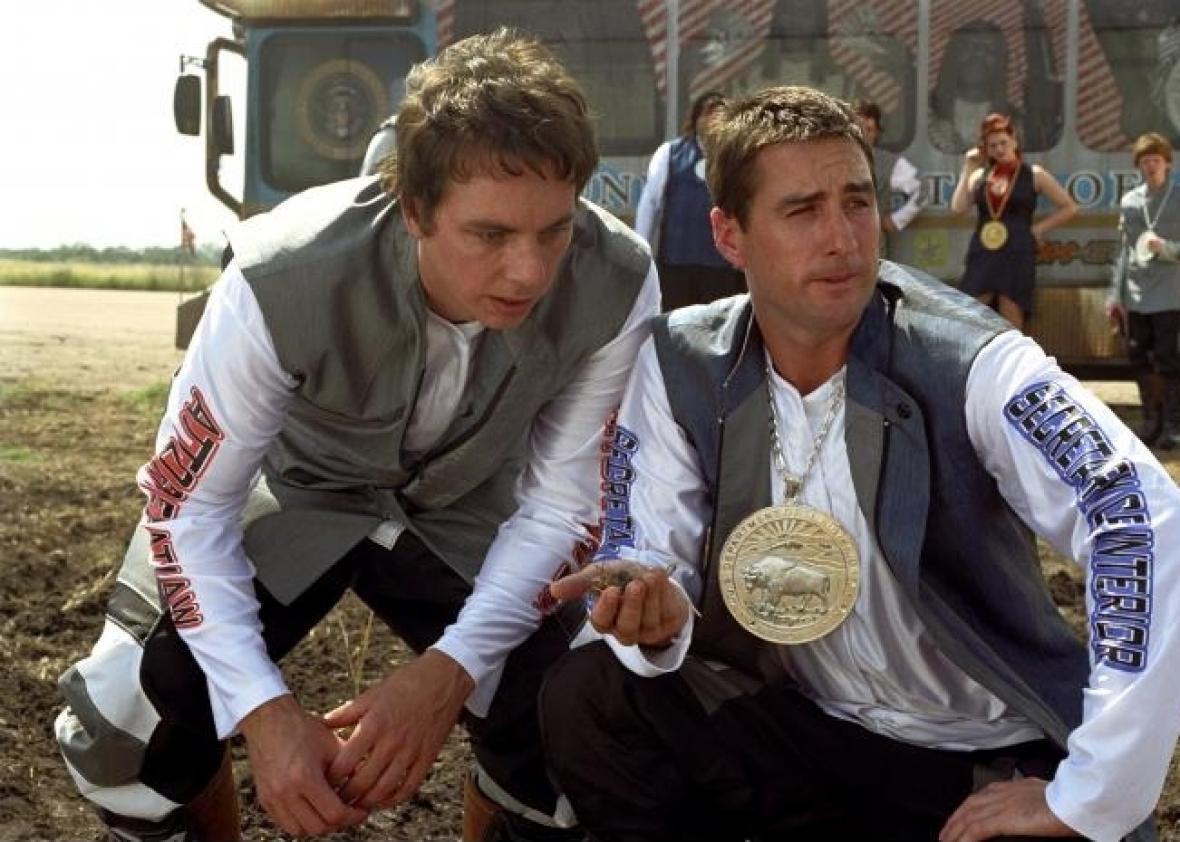As Robert Altman once said of his movie MASH, Mike Judge’s Idiocracy wasn’t released; it escaped. In September of 2006, 20th Century Fox opened the movie, Judge’s first since his cult hit Office Space, in a scant seven cities in North America, including Los Angeles and Chicago but not New York. (I saw it in Toronto, in an opening-night crowd of eight people.) There were no screenings for critics, no publicity campaign, no interviews with Judge or stars Luke Wilson or Maya Rudolph, nor any comment from Fox on the movie’s bizarre treatment, but the studio’s approach went beyond apathy into outright vindictiveness. When the Associated Press asked Fox for a photo to accompany an article about the movie’s release, they were refused. The photos existed, a Fox publicist told the AP, but the organization couldn’t have one.
Idiocracy’s 10th anniversary has been greeted with substantially greater fanfare. On Tuesday, the movie will screen in nearly four dozen theaters across the U.S.—or more than six times as many as its initial release—followed by a live Q&A with Judge and Rudolph. (You can submit questions via Twitter with the hashtag #IdiocracyToday.) Even in 2006, the movie’s vision of a future ruled by the lowest common denominator, where corporations have taken over the functions of government and the pursuit of short-term gratification has humanity circling the drain, was hailed as prophetic by some of the few critics who managed to see it, and that claim has only grown over the years. Even Judge and his co-writer Etan Cohen have taken up the drumbeat, with Cohen tweeting in February that he “never expected #idiocracy to become a documentary.”
Watching Idiocracy in the age of Trump, one can’t help but be struck by some of the parallels. Luke Wilson’s Joe Bauers, an Army librarian chosen for his remarkable averageness, is the subject of a cryogenics experiment gone awry. Instead of sleeping for a year, he’s out cold for half a millennium, and when he awakes in 2505, it’s to a country that now calls itself “Uhh-merica,” a nation of congenital morons ruled by a former professional wrestler who dresses in star-spangled Spandex and quells dissent by firing a machine gun into the air. Its citizens, who relax in easy chairs with built-in toilets while scooping Crisco-like goo into their mouths, are walking billboards, their disposable clothes crammed with corporate logos. (There’s a similar running gag in Talladega Nights: The Legend of Ricky Bobby, released only a month before, but in that case the brands in question paid for the placement, which leaves open the question of who’s exploiting whom.) Although the world has inexplicably dodged the bullet of climate change, it’s teetering on the brink of environmental catastrophe; there are literal mountains of garbage, and the fields have turned to dust thanks to a sports drink company’s successful campaign to convince people it should be used to irrigate crops as well. When Joe, whose 100 IQ makes him a genius in this nation of dopes, suggests they might try watering their plants with, well, water, it’s too odd an idea for anyone to swallow. “You mean, like out of the toilet?”
The world of Idiocracy comes to pass, according to the movie’s prologue, because smart people are simply out-bred: While they’re paying attention to their careers and putting off kids till their 40s, the dim bulbs are breeding like rabbits. It’s pushing it a tad to call the movie “pro-eugenics,” as AlterNet’s Adam Johnson did earlier this year, but as much as liberals may see it as a premature portrait of the Trump voter, its vision is strikingly similar to the “cultural genocide” feared by many Trump supporters, with the notable omission of race. The movie is careful to spread the blame for the national epidemic of idiocy around—the narrator notes that “the English language had deteriorated into a hybrid of hillbilly, valley girl, inner-city slang, and various grunts”—but the fear of a nation overrun with substandard specimens has resonance all along the political spectrum.
What defines the world of Idiocracy, though, isn’t the stupidity of its inhabitants so much as their proud, archetypically American ignorance. Their computers, apparently left over from time when there were still people with brains enough to design them, recognize Joe as the smartest person in the world, but rather than learn from his superior intellect, they resent it: When he checks into a hospital, the doctor’s official diagnosis is, “You talk like a fag, and your shit’s all retarded.” They know their world is dying, but damned if they’ll let anyone tell them how to fix it. They’d much rather hear President Camacho’s (Terry Crews) confident promise, “I got a three-point plan to fix everything,” even if that plan ultimately amounts to passing the buck to someone else.
There’s nothing easier than categorizing your political opponents as idiots, or to use the more delicate term, low-information voters. But Americans who still think that President Obama is a Muslim aren’t, at least in some cases, as uninformed as much as they are willfully misinformed. They can quote you chapter and verse from email forwards and Infowars-spawned conspiracy theories, ingesting any information-type tidbit that reinforces what they already believe. When Joe tells the future president’s Cabinet that sports drinks aren’t meant for agricultural use, the secretary of State responds, with a puzzled frown, “But Brawndo’s got what plants crave.” The secretary of Education chips in, “It’s got electrolytes.” It’s clear that none of them knows what electrolytes are, but they must be good: Otherwise, why would Brawndo advertise them? Likewise, it doesn’t matter how many statistics show that crime rates have dropped: Trump voters know things are worse, and no amount of soft-hearted rhetoric will convince them otherwise. It’s history, brought to you by Carl’s Jr.
